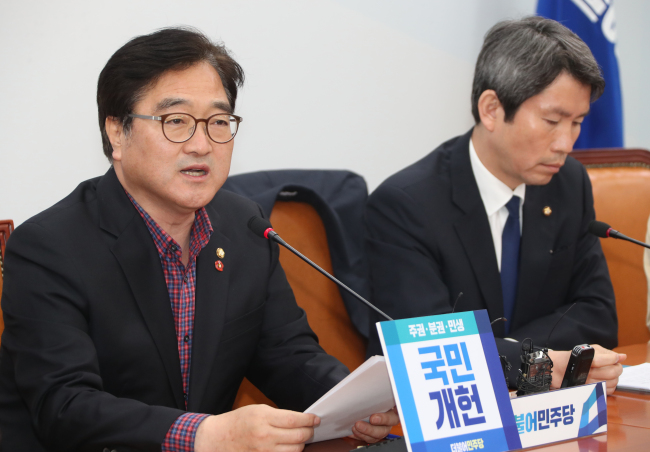South Korea's National Assembly stalled over law on media independence
By Claire LeePublished : April 8, 2018 - 18:17
Rival parties continue to trade barbs over the controversial broadcast law reforms which will partially deprive the ruling party of its authority to select and appoint the heads of public broadcasters, leading the country’s opposition parties to boycott plenary sessions at the National Assembly as a way to push for the proposal’s approval.
The ongoing boycott by the opposition parties over the broadcast law reform has crippled the National Assembly this month.
The long-pending reform proposal, which was submitted by the ruling Democratic Party when it was the main opposition during the Park Geun-hye administration, calls for a revision of the current procedure where the ruling party members, including the president, have more power when appointing KBS board members and its CEO.
The ongoing boycott by the opposition parties over the broadcast law reform has crippled the National Assembly this month.
The long-pending reform proposal, which was submitted by the ruling Democratic Party when it was the main opposition during the Park Geun-hye administration, calls for a revision of the current procedure where the ruling party members, including the president, have more power when appointing KBS board members and its CEO.

When the proposal was first filed in 2016, the main opposition Liberty Korea Party, which was the ruling party at the time, fiercely opposed the reform. Now the table has turned and the conservative party, along with other opposition parties including Bareunmirae Party, have been calling for the passage of the proposal -- criticizing the now-ruling Democratic Party for “trying to control the media” and destroy their editorial independence.
The feud between the rival parties escalated further after President Moon Jae-in, who had been initially supporting the reform proposal prior to taking office, abruptly changed his stance in August. During a meeting with officials at the Ministry of Science and ICT, Moon said the reform may end up allowing individuals “without any (political) opinions or philosophy” to lead the nation’s public broadcasters.
On Sunday, Woo Won-shik, the floor leader of the ruling party, said, “The Democratic Party is willing to accommodate and discuss with the opposition parties regarding the reform of the broadcast laws.” He suggested that the reform should be aimed at eliminating all politically-affiliated figures from being appointed as board members of public broadcasters instead.
The opposition parties immediately criticized the ruling party for its “hypocrisy,” stressing that the initial proposal was written and submitted by the Democratic Party back in 2016, and therefore there should be no reason for them to review it once again.
“If they are really willing to work for the freedom of the press and editorial independence, the ruling party should prove (their willingness) by approving the reform proposal this month at the National Assembly,” said Rep. Oh Shin-hwan, a lawmaker of the minor opposition Bareunmirae Party.
The ongoing boycott of the National Assembly by the opposition parties over the broadcast law reform has made it impossible for the parliament to review other major items, including a revised supplementary budget of some 4 trillion won ($3.7 billion) to create more jobs for young Koreans, as well as the revision of the law on national referendums.
If the law on national referendums is not revised at the National Assembly by the end of this month, a vote on a constitutional amendment which the current Moon government aims to materialize in the June 13 local elections will not be possible.
Regardless of the ongoing conflict at the National Assembly, public broadcasters have long been politically vulnerable compared to their counterparts in other democracies.
Instead of a merit-based and open selection process, the board members and CEOs of Korean public broadcasters are virtually appointed by the president at the recommendation of the political parties. Currently, seven members associated with the ruling party and four associated with the opposition party are serving as boarding members for KBS. For FBC, the state-run body in charge of local TV and radio broadcaster MBC’s management, six are linked with the ruling party, while three are from the opposition party.
The reform proposal calls for at least six members of each public broadcaster’s board to be those associated with opposition parties, while limiting the number of those from the ruling party to seven. The proposal also states that each broadcaster’s appointments of its CEOs must be made following an internal election among board members; those who received more than 75 percent of votes will be allowed to be appointed as CEOs.
“This reform is the least the nation’s legislature can do in order to protect editorial independence of the state broadcasters,” said Kim Min-jeong, a professor at Hankuk University of Foreign Studies’ media communications department at a recent public debate held at the National Assembly.
Many journalists at the broadcasters have also protested against the current system, claiming it severely damages their editorial independence. Former MBC CEO Kim Jae-chul, for one, had been known to be closely associated with former President Lee Myung-bak since the mid-90s, when he was appointed as the broadcaster’s head in 2010.
By Claire Lee (dyc@heraldcorp.com)


















![[Today’s K-pop] Treasure to publish magazine for debut anniversary](http://res.heraldm.com/phpwas/restmb_idxmake.php?idx=642&simg=/content/image/2024/07/26/20240726050551_0.jpg&u=)